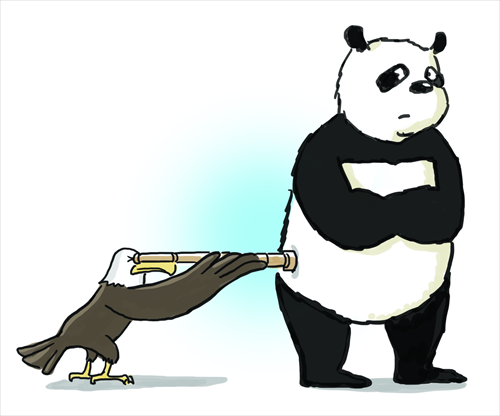HOME >> OP-ED, LAZY PACK
Does Western reporting on HK measure up?
By Ding Gang Source:Global Times Published: 2014-10-8 23:38:01

Illustration: Liu Rui/GT
If we view the reports of Western media on the Occupy Central movement in Hong Kong as a test of how accurately they understand China, do they pass?
These reports have either gone too far to exaggerate the influence of the movement or deliberately played up the ideological confrontation.
A report in the New York Times said, "hundreds of protesters continue to occupy the streets of Hong Kong, challenging China's Communist Party leaders with calls for greater democracy" while the central authorities have "limited tools to quell unrest in Hong Kong."
According to a commentary piece published in the Financial Times, "The demonstrations on the streets of Hong Kong present China with its biggest political challenge" since 1989.
The Telegraph, another UK media outlet, claimed Occupy Central was "a matter of life and death." And the Economist chose "The Party v the people" as the title for the cover story of its latest edition.
Almost all Western media outlets used "revolution" to describe the situation in Hong Kong.
If you read these lurid reports to Chinese tourists scattered across China and other countries for holidays, they will probably burst into laughter.
No one denies the problems in Hong Kong society, notably the fact that some Hong Kong people aren't satisfied with the chief executive election procedures and the widening wealth gap. But these problems cannot in any way be resolved by street politics, a point on which Western media also agree.
The O'Reilly Factor, a US TV program, said of Occupy Wall Street in 2011, "if you put every single left-wing cause into a blender, this is the sludge you'd get."
Nevertheless, now that Hong Kong is seeing a similar movement, the role and nature of street politics have both changed; they suddenly become a tool for promoting democracy.
The unexpected emergence of such simplistic, reckless judgments is due in part to unreconstructed views of China in Western media.
After the Occupy Central protests began, a BBC talk show invited Martin Jacques, author of When China Rules the World: The End of the Western World and the Birth of a New Global Order, to discuss the situation in Hong Kong.
However, when Martin started to talk about how Hong Kong's democracy could be viewed through the lens of development, the host interrupted him rudely.
Martin's view on Occupy Central is open to debate. But more importantly, he was putting forward a new way of observing China.
If people continue to use stereotypes that are decades or centuries old to interpret today's China, trying to shoehorn complicated issues like the Occupy Central movement into the logic of Western democracy, all driven by a subconscious need to place Chinese and Western values in confrontation, how can they accurately grasp modern China?
Nowadays Beijing possesses more wisdom, ability and patience to tackle issues like the Occupy Central movement. These issues are unlikely to shake the foundation of social stability against the backdrop of China's sustained development. This should be the jumping-off point for any judgment of China's status quo.
More importantly, China's central government is increasingly confident in dealing with such incidents and harnessing their influence.
In view of China's rapid development during the past decade or more, the improvement of China's position on the world stage, and the narrowing gap between Hong Kong and mainland cities such as Shanghai, Guangzhou and Shenzhen, it is easy to understand where such confidence comes from. Democracy is not an empty doctrine; its value lies in whether it creates a foundation for stable development. This is the starting point to correctly evaluate China and how it is governed. Any judgment that deviates from this point is doomed to error.
In June 1995, the Fortune magazine published a cover story about "The Death of Hong Kong." But in 2007 its sister publication, Time magazine, said in a story that, "A decade after its return to China in 1997, Hong Kong is more vibrant and spectacular than ever."
History will offer its verdict on the current reports by Western media on Occupy Central, but there remains one unmistakable fact: Most of the students protesting on the Hong Kong streets today will see their future life and career tied to the mainland, and they are destined to be beneficiaries of the stability of China as a whole.
The author is a senior editor with People's Daily. He is now stationed in Brazil. dinggang@globaltimes.com.cn. Follow him on Twitter at @dinggangchina
Posted in: Columnists, Viewpoint, Commentary